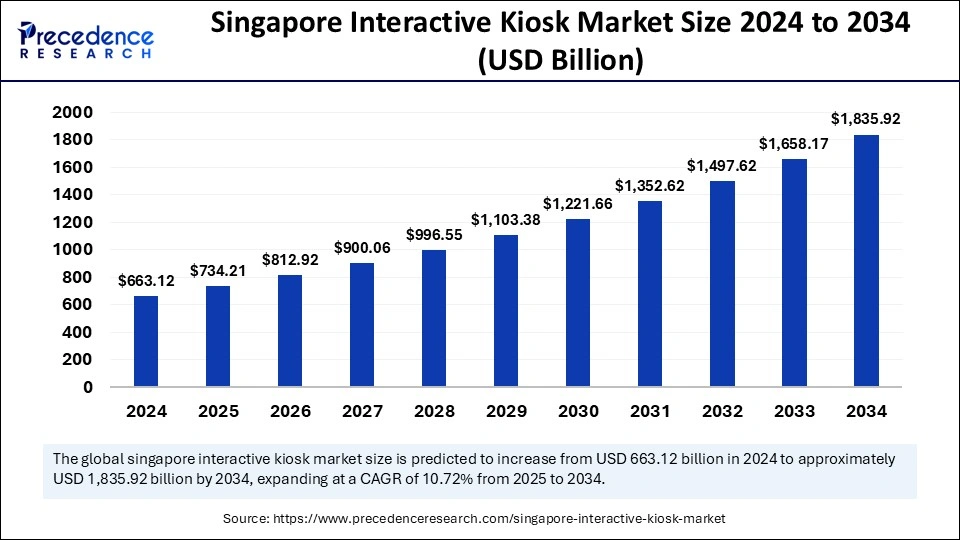The Singapore interactive kiosk market is projected to grow from USD 663.12 billion in 2024 to USD 1,835.92 billion by 2034, at a CAGR of 10.72%.

Singapore Interactive Kiosk Market Key Takeaways
-
The hardware segment held the largest market share in 2024 by component.
-
The software segment is expected to experience the fastest growth during the forecast period by component.
-
The automated teller machines (ATMs) segment accounted for the highest market share in 2024 by type.
-
The retail self-checkout kiosk segment is projected to grow at the fastest rate over the forecast period by type.
-
The BFSI segment dominated the market with the largest share in 2024 by end use.
-
The food & beverage segment is anticipated to witness the most rapid growth during the forecast period by end use.
Singapore Interactive Kiosk Market Overview
The Singapore interactive kiosk market is expanding rapidly as the country embraces digital transformation and smart city initiatives. Interactive kiosks, which include self-service machines for banking, retail, healthcare, transportation, and hospitality, are increasingly deployed to enhance user experience and operational efficiency.
Singapore’s government has been a strong proponent of digital infrastructure, and interactive kiosks align with the country’s vision of a smart, technologically advanced nation. From ticketing and wayfinding kiosks to self-ordering systems in restaurants and automated service kiosks in healthcare facilities, the demand for interactive kiosks is rising due to their ability to streamline processes and reduce the need for human intervention.
Singapore Interactive Kiosk Market Drivers
One of the key drivers of the interactive kiosk market in Singapore is the country’s strong focus on automation and efficiency in public and private sectors. As a global financial and technological hub, Singapore is at the forefront of adopting self-service solutions to enhance customer experience and optimize business operations. The growing emphasis on contactless transactions, accelerated by the COVID-19 pandemic, has further fueled the adoption of interactive kiosks in retail stores, transport hubs, and healthcare facilities.
Additionally, advancements in touchscreen technology, artificial intelligence, and cloud-based connectivity have made interactive kiosks more efficient, secure, and user-friendly, encouraging their widespread deployment.
Singapore Interactive Kiosk Market Opportunities
The integration of AI and IoT in interactive kiosks presents significant opportunities for market growth. Smart kiosks equipped with facial recognition, voice assistance, and data analytics are being deployed across various sectors to personalize services and improve customer interactions. The increasing adoption of digital payment solutions and mobile wallet integration in kiosks is also driving demand, particularly in the retail and food service industries.
Furthermore, the tourism and hospitality sectors are leveraging interactive kiosks for seamless check-ins, wayfinding, and travel information services, presenting new growth avenues in Singapore’s thriving tourism industry.
Singapore Interactive Kiosk Market Challenges
Despite the strong market growth, challenges such as high initial investment costs and maintenance requirements pose barriers to wider adoption. Businesses must also ensure compliance with Singapore’s strict data privacy regulations when deploying kiosks with AI-powered analytics and biometric recognition capabilities.
Additionally, some customers may require time to adapt to self-service models, especially in industries where human interaction remains a preference. Technical issues, such as software malfunctions and cybersecurity threats, further add to the operational risks of interactive kiosks.
Singapore Interactive Kiosk Market Regional Insights
Singapore’s strategic position as a smart city leader in Asia makes it one of the most advanced markets for interactive kiosks. The country’s government actively promotes digital innovation, and its robust infrastructure supports the rapid deployment of self-service solutions across multiple sectors.
The demand for interactive kiosks is highest in urban areas, particularly in business districts, shopping malls, and transportation hubs, where automated services help reduce congestion and improve efficiency. The market is also expanding in suburban areas as businesses look to enhance service delivery in residential neighborhoods.
Singapore Interactive Kiosk Market Recent Developments
Recent developments in the Singapore interactive kiosk market include the rollout of AI-powered customer service kiosks in government service centers and retail locations. Companies are also investing in cloud-based management systems that allow real-time monitoring and remote troubleshooting of kiosks.
The introduction of biometric authentication and digital identity verification in self-service kiosks has improved security and streamlined transactions across banking, healthcare, and public service sectors. Additionally, partnerships between technology providers and businesses have led to the deployment of multilingual kiosks catering to Singapore’s diverse population.
Singapore Interactive Kiosk Market Companies
- XIPHIAS Software Technologies Pvt. Ltd.
- AOGO Technologies
- Uniconnect Systems Pte Ltd
- NCR Corporation
- Zebra Technologies Corporation
- KIOSK Information Systems
- Diebold Nixdorf
- Toshiba Commerce Solutions
- Slimline Kiosks
- Advantech Co., Ltd.
- Meridian Kiosks
- Fujitsu Limited
- TouchPoint Solutions
By Component
- Hardware
- Display
- Printer
- Others
- Software
- Integration & Deployment
- Managed Services
- Services
- Windows
- Android
- Linux
- Others (iOS, Others)
By Type
- Automated Teller Machines (ATMs)
- Retail Self-Checkout Kiosk
- Self Service Kiosk
- Vending Kiosk
By End Use
- BFSI
- Retail
- Food & Beverage
- Healthcare
- Government
- Travel & Tourism
Ready for more? Dive into the full experience on our website!